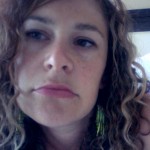Arielle Greenberg
This post is part of a series on SRPR’s ongoing and evolving conceptualization of the Poetics of Emplacement. What do we mean by Poetics of Emplacement? SRPR’s editor, contributing editors, staff members and friends share their thoughts here.
When I moved to a small town in rural Maine after a lifetime of living in big cities and suburbs, I struggled to imagine how I might shift my poetics to suit my new landscape and life. Maine is blessed with a long and important lineage of place-based poets, but I myself have little expertise or passion, and thus little to contribute, to the many great poems about the sea, the woods, and the farm. I live in town.
(I was about to say that here in Maine, I do enjoy spending more time outside by choice, interacting with that thing we call “nature,” than I did when I lived in New York City or Chicago…but I’m not entirely sure that’s true. In New York, I walked everywhere, and made decent use of Central Park. In Chicago, I ran along Lake Michigan several times a week.)
What seemed important to me, though, was to find my own role, my own voice, as a poet “of Maine,” and of this new life which I did in fact choose for reasons related very much to place: access to local food, to clean air, to small communities, to small farmers.
The poetry I’ve ended up writing, almost exclusively, since moving to Maine, is not what I expected to be writing, but it’s a direct response to this notion that I am here, and no longer in a city, living a more “wholesome” life. The poems, a series, are engaged in the notion of the pastoral—and in ferreting out both the wholesome and the earthy “dirtiness” of that tradition. These “country” poems are the most sexually explicit, culturally taboo, and provocative things I’ve probably ever written, and in each one, I am thinking about the very direct correlation, to my mind, between issues like clean air and water and issues like gender politics, BDSM, the human as (sexual) animal, and graphic language.
It seems to me this is writing on a kind of border, yes?
≅

Arielle Greenberg is the author of several books, including My Kafka Century and, with Rachel Zucker, Home/Birth: A Poemic. She writes a column on contemporary poetics for the American Poetry Review and teaches out of her home in Maine and through the new low-res MFA program at Oregon State University-Cascades. At the moment, she is interested in all things “primal.”
